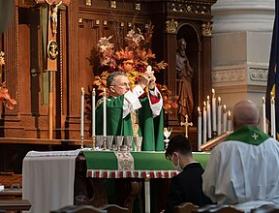My heart goes out to Dr Theo Boer.
He doesn’t sound as if he gets it, at least not yet, but he’s come far enough to know, in his own words, that he was “ … wrong … terribly wrong” to have supported euthanasia in the Netherlands.
What he doesn’t seem to get — at least not yet — is that euthanasia is not wrong because abuse of legalized murder is always going to happen; because in his words, “once the genie is out of the bottle, it is not likely to ever go back in again.” Euthanasia is wrong because murder is wrong. It is wrong to kill people.
He doesn’t sound as if that has seeped through to him yet.
Who is Dr Theo Boer and why does his opinion matter? Dr Boer is a Dutch professor and ethicist, who The Mail calls “a European assisted suicide watchdog.” He is, in short an expert on how legalizing euthanasia is playing out in the real world. And his knowledge has taught him regret.
According to Dr Boer’s testimony before the House of Lords, he advocated for the legalization of euthanasia in the Netherlands. But the resulting use of the practice to kill anyone who’s troubled for whatever reason has changed his mind.
Professor Boer argued seven years ago that a “good euthanasia law would produce relatively low numbers of deaths.” Now he now wonders if “the very existence of a euthanasia law turns assisted suicide from a last resort to a normal procedure.”
He also said that he worries about changes in the law to allow the killing of children, those with dementia and those who are simply depressed He sees the “the mobile death units of traveling euthanizing doctors” and has come to the conclusion that “activists continue to campaign for doctor-administered death … and will not rest until a lethal pill is made available to everyone over 70.”
I don’t know if it’s fully come home to him what this means, but Dr Boer will have to live with what he has done for the rest of his days. His comment that you can’t get the genie back in the bottle again sounds as if he’s come against the terrible truth that un-doing evil is much more difficult than doing it in the first place.
My heart goes out to him because I’ve been there. I’ve learned the hard way that you can’t unkill people. You can go back to the people you led astray and say, “I was wrong,” but you can’t make them listen to you. The downward trajectories you helped set in motion keep rolling on and nothing you do can stop them.
I’ve also learned absolutely and without doubt that I am not God. That’s why I don’t quibble — ever — with the 2,000-year-old teachings of the Catholic Church. If I had followed those teachings and looked for other ways to deal with the injustice and suffering that led me into doing wrong, I would not have done wrong in the first place.
I don’t think Dr Boer has arrived at that place yet. He knows a bit of the horror he helped unleash. He’s evidently a man of moral courage. I say that because it takes moral courage to admit you were wrong about something like this.
Most people won’t do it. They will keep on justifying their mistakes right down to the grave. They will not admit that they have done a terrible thing, that they have been somebody’s monster, that they were, in Dr Boer’s words, “terribly wrong.” And they die and face God in their sins.
I thank God for Dr Boer’s courage. I pray that he goes all the way down this road until it leads him to the only place where these things can be made right, which on his knees in front of the cross.
Here, from the Daily Mail, is Dr Boer’s testimony. I also urge you to read the Daily Mail article which accompanied it.

‘ASSISTED DYING: DON’T GO THERE’: DUTCH ETHICIST THEO BOER’S THOUGHTS ON EUTHANASIA IN FULL
In 2001 The Netherlands was the first country in the world to legalise euthanasia and, along with it, assisted suicide. Various ‘safeguards’ were put in place to show who should qualify and doctors acting in accordance with these ‘safeguards’ would not be prosecuted. Because each case is unique, five regional review committees were installed to assess every case and to decide whether it complied with the law. For five years after the law became effective, such physician-induced deaths remained level – and even fell in some years. In 2007 I wrote that ‘there doesn’t need to be a slippery slope when it comes to euthanasia. A good euthanasia law, in combination with the euthanasia review procedure, provides the warrants for a stable and relatively low number of euthanasia.’ Most of my colleagues drew the same conclusion.
But we were wrong – terribly wrong, in fact. In hindsight, the stabilisation in the numbers was just a temporary pause. Beginning in 2008, the numbers of these deaths show an increase of 15% annually, year after year. The annual report of the committees for 2012 recorded 4,188 cases (compared with 1,882 in 2002). 2013 saw a continuation of this trend and I expect the 6,000 line to be crossed this year or the next. Euthanasia is on the way to become a ‘default’ mode of dying for cancer patients.
Alongside this escalation other developments have taken place. Under the name ‘End of Life Clinic,’ the Dutch Right to Die Society NVVE founded a network of travelling euthanizing doctors. Whereas the law presupposes (but does not require) an established doctor-patient relationship, in which death might be the end of a period of treatment and interaction, doctors of the End of Life Clinic have only two options: administer life-ending drugs or send the patient away. On average, these physicians see a patient three times before administering drugs to end their life. Hundreds of cases were conducted by the End of Life Clinic. The NVVE shows no signs of being satisfied even with these developments. They will not rest until a lethal pill is made available to anyone over 70 years who wishes to die. Some slopes truly are slippery.
Other developments include a shift in the type of patients who receive these ‘treatments’. Whereas in the first years after 2002 hardly any patients with psychiatric illnesses or dementia appear in reports, these numbers are now sharply on the rise. Cases have been reported in which a large part of the suffering of those given euthanasia or assisted suicide consisted in being aged, lonely or bereaved. Some of these patients could have lived for years or decades.
Whereas the law sees assisted suicide and euthanasia as an exception, public opinion is shifting towards considering them rights, with corresponding duties on doctors to act. A law that is now in the making obliges doctors who refuse to administer euthanasia to refer their patients to a ‘willing’ colleague. Pressure on doctors to conform to patients’ (or in some cases relatives’) wishes can be intense. Pressure from relatives, in combination with a patient’s concern for their wellbeing, is in some cases an important factor behind a euthanasia request. Not even the Review Committees, despite hard and conscientious work, have been able to halt these developments.
I used to be a supporter of the Dutch law. But now, with twelve years of experience, I take a very different view. At the very least, wait for an honest and intellectually satisfying analysis of the reasons behind the explosive increase in the numbers. Is it because the law should have had better safeguards? Or is it because the mere existence of such a law is an invitation to see assisted suicide and euthanasia as a normality instead of a last resort? Before those questions are answered, don’t go there. Once the genie is out of the bottle, it is not likely to ever go back in again.
Theo Boer has been a Member of a Regional Review Committee since 2005. For the Dutch Government, five such committees assess whether a euthanasia case was conducted in accordance with the Law. In the past nine years, Prof. Boer has reviewed almost 4,000 euthanasia cases. The views expressed here represent his views as a professional ethicist, not of any institution.












